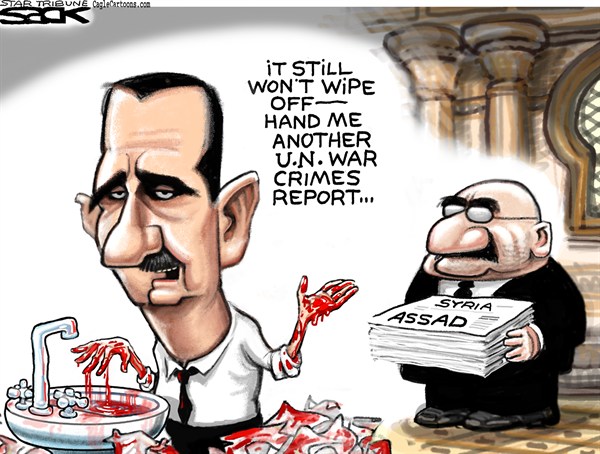Forum Post: dedicated to a true man of peace
Posted 11 years ago on March 28, 2013, 7:59 a.m. EST by mideast
(506)
This content is user submitted and not an official statement

Assad opposed at Arab summit
SAMI ABOUDI AND YARA BAYOUMY
Last updated 05:00 27/03/2013
Arab Summit
FAHAD SHADEED/ Reuters
LEFT OUT: Syria had a seat, but no representative at an Arab summit where other leaders united against President Bashar al-Assad.
To applause from Arab heads of state, a foe of Bashar al-Assad has taken Syria’s vacant seat at an Arab summit, deepening the president’s diplomatic isolation and diverting attention from rifts among his opponents.
Speaking at an annual gathering of Arab leaders in the Gulf state of Qatar, Moaz Alkhatib said he had asked US Secretary of State John Kerry for American forces to help defend rebel-controlled northern parts of Syria with Patriot surface-to-air missiles now based in Turkey. Nato swiftly rebuffed the idea.
‘‘It was a historic meeting,’’ said Syrian opposition spokesman Yaser Tabbara.
‘‘It’s a first step towards acquiring full legal legitimacy.’’
__The 22-nation Arab League lent its support to giving military aid to Syrian rebels. A summit communique offered some of its toughest language yet against Assad, affirming member states had a right to offer assistance ‘‘including military, to support the steadfastness of the Syrian people and the Free Army’’.
Alkhatib said the United States, which has given non-military aid to Syrian rebels, should play a bigger role in helping end the two-year-old conflict in Syria, blaming Assad’s government for what he called its refusal to solve the crisis.
‘‘I have asked Mr Kerry to extend the umbrella of the Patriot missiles to cover the Syrian north and he promised to study the subject,’’ he said, referring to Nato Patriot missile batteries sent to Turkey last year to protect Turkish airspace.
‘‘We are still waiting for a decision from Nato to protect people’s lives, not to fight, but to protect lives,’’ he added, addressing a body that barred Assad’s government in late 2011.
Responding to Alkhatib’s remarks, an official of the Western military alliance at its headquarters in Brussels said: ‘‘Nato has no intention to intervene militarily in Syria.’’
Turkey, which reported a mortar landing harmlessly on its border on Tuesday, said it was up to the rest of Nato to decide if members wanted to expand the remit of the Patriot batteries.
Michael Stephens, a researcher based in Qatar for Britain’s Royal United Services Institute, said acceding to Alkhatib’s request would effectively put Nato at war with Damascus.
DEFENSIVE DEPLOYMENT
Nato’s current deployment of three Patriot missile batteries in southern Turkey is intended to be purely defensive. The Patriots are designed to shoot down hostile missiles in mid-air.
Alkhatib, a Sunni Muslim cleric, took Syria’s seat at the summit for the first time despite announcing on Sunday that he would step down as leader of the Syrian National Coalition. Behind him sat Ghassan Hitto, the prime minister of a provisional opposition government that plans to run rebel-held area, and fellow senior opposition official George Sabra.
Alkhatib criticised what he called Western failure to bring an end to the conflict, and said an influx of foreign Islamist fighters should not be used by the West as a pretext to deny Syrians meaningful help. He denounced the presence in Syria of Iranians and Russians he said were backing the government.
Speaking at a news conference at the end of the summit: Qatar Foreign Minister Sheikh Hamad bin Jassim al-Thani defended the summit’s support for arming the rebels, saying that while it was not a ‘‘preferable’’ policy there appeared little alternative. ‘‘We have done all we could to find a peaceful solution,’’ he said.
‘‘Unfortunately this solution did not come because... the regime was betting on a solution by force.’’ But Kofi Annan, the former UN chief who tried to mediate an end to the fighting, said he expected little outside military intervention.
He told an audience in Geneva: ‘‘We left it too late.’’ He added: ‘‘The Syrian people... are waiting for the killing to stop... as late as it is, we have to find a way of pouring water on the fire, rather than the other way around.’’ He described as a ‘‘gross underestimate’’ the United Nations figure of 70,000 killed in a conflict that began with anti-Assad protests and turned into a sectarian-tinged armed insurrection.
The war in Syria has divided world powers, paralysing action at the UN Security Council. The Arab world is also split, with Saudi Arabia and Qatar the most fervent foes of Assad, and Iraq, Algeria and Lebanon the most resistant to calls for his removal.
The conflict echoes strains between Sunni Muslims, notably in the Gulf, and Shi’ites, in Iraq, Lebanon and non-Arab Iran, whose faith is related to that of Assad’s Alawite minority.
Syrian rebels again fired mortar rounds into central Damascus on Tuesday. State television said several people had been wounded by ‘‘terrorist’’ mortar bombs that landed in the Syrian Arab News Agency Sana compound in the Baramkeh district.
Syrian state TV did not cover the Arab League meeting in Qatar, airing a programme on makeup for women instead.
A group of pro-Assad hackers signing themselves the Syrian Electronic Army claimed an attack on an Arab League website that directed readers to a picture of Assad and derided the League’s Egyptian secretary-general for his ‘‘loyalty to the sheikhs’’.